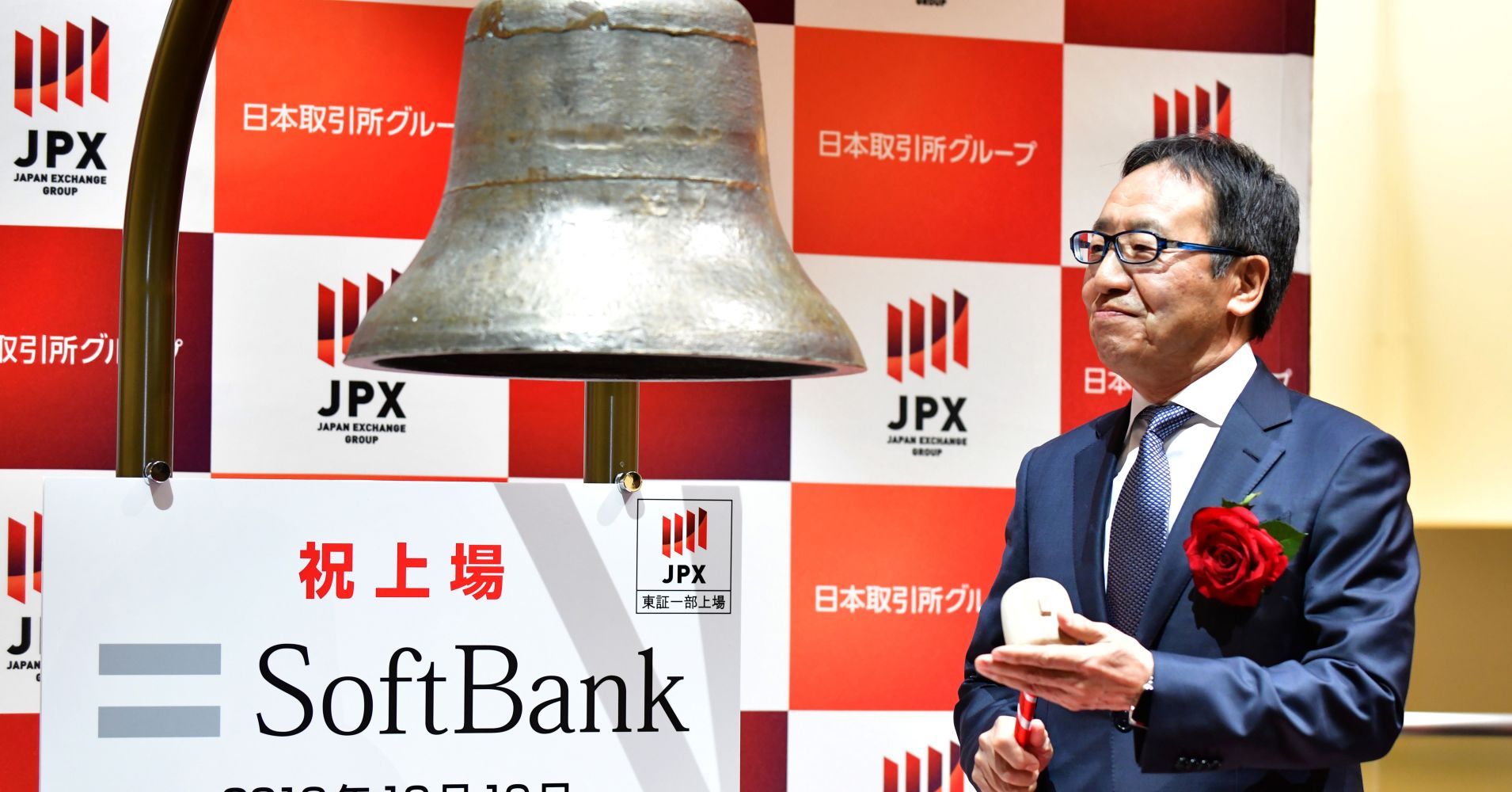
Shares of SoftBank Corp — Japan’s biggest-ever IPO and one of the world’s largest — fell more than 10 percent on its market debut Wednesday, after opening 6.40 percent lower.
The company is the mobile unit of billionaire Masayoshi Son’s SoftBank Group holding company, which includes U.S. telecoms company Sprint. The group also holds significant stakes in Yahoo Japan and Chinese e-commerce giant Alibaba Group.
SoftBank Corp raised 2.65 trillion yen ($23.5 billion) after pricing the offering at 1,500 yen a share and increased the amount of stock sold by 160 million shares in a response to strong demand, Reuters reported.
That makes it Japan’s biggest IPO and just below Alibaba’s record $25 billion listing on Wall Street in 2014, according to Reuters.
In early afternoon trading, SoftBank shares were at 1,338.00 yen, down 10.8 percent, although it declined by more than 12 percent earlier in the trading session.
SoftBank is Japan’s third-largest mobile phone company after leaders NTT Docomo and KDDI, but concerns are rising over saturation in the market as online retailer Rakuten has also obtained a mobile license and is set to begin offering services in October of next year.
Japan’s mobile telecoms market is the world’s third largest and the government has been pressuring companies to lower prices for their services.
In addition to concerns about competition in the Japanese market, SoftBank has faced headwinds in the run-up to the IPO on other worries, such as the group’s 18 trillion yen ($160 billion) in debt as of the end of September and a nationwide network service outage of more than four hours on Dec. 6 for which the company publicly apologized.
“There’s a lot of company-specific issues unique to SoftBank in this listing,” Romaine Jackson, capital markets specialist at Dealogic, said on CNBC’s “Street Signs” in explaining the opening day drop.
“I do think it’s bucking the trend because if you look at returns to investors in the Japanese IPO space this year it’s actually been quite positive,” Jackson said, adding that the overall economic and political environment in Japan has also been supportive.
Another issue is SoftBank’s exposre to hardware supplied by Chinese tech giant Huawei, which is under pressure from the United States and other countries suspicious that its telecommunications equipment represents a potential security threat, something that Huawei denies.
SoftBank will be replacing its Huawei hardware in its 4G network infrastructure over the next few years and using equipment from Ericsson and Nokia instead, according to Japan’s Nikkei Asian Review. It is also expected to place orders with the two European companies for its 5G networks, the Nikkei reported.
Sprint’s prospective $26 billion merger with Deutsche Telekom-owned T-Mobile U.S., meanwhile, was approved by the U.S. government on Monday after SoftBank and the German company said they would stop using Huawei’s equipment, Reuters reported.
The listing on the Tokyo Stock Exchange also comes as Son, one of the tech world’s most powerful people, makes waves with his $100 billion Vision Fund, and marks the transformation of the group from a mobile carrier to a global investment fund.
“He’s trying to court a new type of investor that actually shares his vision in the outlook for (Internet of Things technology), for robotics and most importantly artificial intelligence,” Chris Lane, senior researcher at Sanford C. Bermstein, said Wednesday on CNBC’s “Squawk Box” before trading began.
“So this is part of that transformation,” Lane said. “I think it’s a fairly major step in that transformation.”
The fund was established in October 2016 and is aimed at boosting promising businesses in the technology sector.
“IPO proceeds will supplement the holding company’s liquidity, although a large part of proceeds to SoftBank may eventually be used to fund its remaining capital commitments to the SoftBank Vision Fund (SVF), which continues to invest in internet and emerging technology businesses,” Moody’s Investors Service said in a report last month.
The fund, which describes itself as “designed to be a catalyst for technology progress,” has invested in in companies such as Nauto and Brain Corp, which is building self-driving “brains” for robots, and ride-hailing giant Uber.
Aside from SoftBank Group, other major investors in the fund include Saudi Arabia’s Public Investment Fund and the United Arab Emirates’ Mubadala Investment Company.
The Saudi contribution has turned controversial after the international outcry over the disappearance and death of Saudi Arabian journalist Jamal Khashoggi in Turkey in October amid accusations of official Saudi involvement. The kingdom, for its part, has maintained that powerful Saudi Crown Prince Mohammed bin Salman did not order Khashoggi’s execution.
Son said last month that he had met with the crown price to raise concerns about the incident.
Son declined to attend a major business conference in Saudi Arabia in October, which was also boycotted by numerous global investment leaders, but visited the kingdom to meet officials and express concerns about the death.
— CNBC’s Akiko Fujita contributed to this report.
